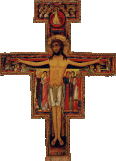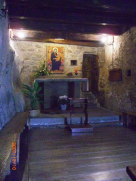 As storms lash the Carolinas, we in dry California are reminded that the seasons are changing. The earth turns, moving toward shorter days and longer nights. The light rain that happily dampened the Bay Area this last week washed the air, baptizing the breeze, and last night temperatures dropped to what Californians might call chilly. Today, on the Feast of St. Francis of Assisi, the creation is full of the glory of God, the sun-drenched air sparkling, the leaves greener, the hills more golden.
As storms lash the Carolinas, we in dry California are reminded that the seasons are changing. The earth turns, moving toward shorter days and longer nights. The light rain that happily dampened the Bay Area this last week washed the air, baptizing the breeze, and last night temperatures dropped to what Californians might call chilly. Today, on the Feast of St. Francis of Assisi, the creation is full of the glory of God, the sun-drenched air sparkling, the leaves greener, the hills more golden.
They say this part of the country is not unlike Italy, and as I contemplate the gentle saint who walked those roads in Umbria and Tuscany in 1215, eight hundred years ago, I marvel again at his complex simplicity.
In my first novel, Pilgrimage, Madeleine and Jack Seymour journey from San Francisco (the city of St. Francis) to Italy. Madeleine’s priest has sent her on a pilgrimage to selected churches and sites; three were Franciscan: Assisi, Cortona, and La Verna. Madeleine reviews a short biography she has brought with her, and I must agree with Madeleine that Francis’s life is difficult to condense:
“Born in Assisi in 1181, the son of a prosperous cloth merchant, Francis Bernadone grew up hearing the tales of wandering troubadours. While fighting Perugia as a young soldier, he was captured. In prison, he had a vision of God; when released, he returned home a changed man. “I am about to take a wife of surpassing fairness,” Francis announced, referring to “Lady Poverty.” He journeyed to Rome and gave his money to Saint Peter’s Basilica; he exchanged his clothes with a beggar.
 Returning to Assisi, he prayed in the church of San Damiano, where God spoke from the altar crucifix: “Repair my house, which is falling into ruin!” Taking the message literally, Francis sold his father’s cloth and tried to give the proceeds to the priest who refused them. Furious, Francis’s father beat his son and locked him in the basement of their family home. Francis escaped and returned to San Damiano for sanctuary.
Returning to Assisi, he prayed in the church of San Damiano, where God spoke from the altar crucifix: “Repair my house, which is falling into ruin!” Taking the message literally, Francis sold his father’s cloth and tried to give the proceeds to the priest who refused them. Furious, Francis’s father beat his son and locked him in the basement of their family home. Francis escaped and returned to San Damiano for sanctuary.
Brought before the bishop, Francis stripped off his clothes. “Hitherto I have called you my father on earth,” he said to his father, “but henceforth I desire to say only ‘Our Father who art in heaven.’ “
He wandered the countryside, singing to God, calling himself a jongleur for God, a troubadour-juggler-fool. Highwaymen robbed him and threw him in the snow. In Gubbio, friends gave him a cloak, a rope, and a staff, the clothes of a begging pilgrim. In Assisi, he rebuilt San Damiano and restored two other chapels. He nursed lepers, searching for God’s will in his life.
In 1208, in the church of Santa Maria degli Angeli in the valley below Assisi, the Gospel reading commanded Christ’s disciples to give up all they owned, and preach repentance and the coming of the Kingdom of God. Francis renounced his few possessions and donned rough peasant sacking. Soon others followed, embracing poverty and preaching God’s love.
The Penitents of Assisi traveled to Rome for approval of their order. At first the pope refused their request, but after a dream where Francis propped up the collapsing Basilica of Saint John Lateran—the pope’s cathedral and symbol of the Church—he agreed to the new order.
Now called the Friars Minor, Francis and his followers lived in small huts in the valley below Assisi; in 1211, they were given the chapel of St. Mary of the Angels, the Porziuncola. They traveled the countryside, preaching and living humbly. The order grew.
Stories of Saint Francis spread throughout Italy. He healed lepers; he nursed the dying; he tamed a dangerous wolf; birds obeyed him. He created a live nativity scene in Greccio—an early crèche. He crusaded to Egypt to convert the Sultan. In 1224, on Monte Verna, east of Florence, he received the stigmata, the five wounds of Christ, from a seraphim angel: his hands and feet were pierced, his side was slashed, and he began a slow hemorrhage.
Two years later, at the age of forty-five, he lay dying. He asked to be buried with the criminals; but after his death his body was placed in the crypt of the Assisi basilica his followers built.”
Pilgrimage (OakTara 2007)
It strikes me that Francis was not particularly interested in caring for the created order, but rather healing the people in it, and only after years of penitence and communion with God did he feel this desire. Francis’s renunciation of material goods, his poverty, somehow opened his body and soul to God, allowing God to enter and take up residence. We call this the sacramental life, for Francis became the matter that would become infused with God.
Christians experience this infusion in the bread and wine of the Eucharist, in the waters of Baptism, in the oils of Anointing the Sick. God enters his creation – the material world – and transforms it with himself. We call these transformations miracles.
Francis gave to God his spirit and his flesh, his life and his body, his “Brother Ass.” He became a penitent beggar. He suffered as any would suffer from cold and heat and fasting. At first he simply wandered the roads, singing to God. But as God entered him and united with him, within him, Francis began to care for the lepers and the lost. He gave no advice in regards to climate change or population control or environmental hazards, at least to my knowledge.
Francis, full of Christ, brought God to the villages and churches of Italy. He was the host, the means, through which God could touch his people. It was natural, that as God burned brighter and brighter within him, that he would desire to experience the love Christ felt for the world when he died. It was natural that he would pray in a cave on Mount La Verna to be given the stigmata, the five wounds of Christ. He would die two years later from those slowly bleeding wounds.
 We once visited Le Celle outside Cortona. Home of Capuchin Friars, St. Francis’s cell can be seen – a cave-like room, hard bed, an image of the Virgin Mary, an altar. The convento, monastery, hangs on the side of the mountain, overlooking a gorge.
We once visited Le Celle outside Cortona. Home of Capuchin Friars, St. Francis’s cell can be seen – a cave-like room, hard bed, an image of the Virgin Mary, an altar. The convento, monastery, hangs on the side of the mountain, overlooking a gorge.
 We too must be simple enough to open our hearts to God to allow him to dwell within, always aware that it might be more complicated than that, that the Creator will transform us when he enters into someone who will allow God to touch his people. He will lead us where we must go, not always where we want to go, turning our time into eternity, turning our earth toward him, bathing in his light.
We too must be simple enough to open our hearts to God to allow him to dwell within, always aware that it might be more complicated than that, that the Creator will transform us when he enters into someone who will allow God to touch his people. He will lead us where we must go, not always where we want to go, turning our time into eternity, turning our earth toward him, bathing in his light.
